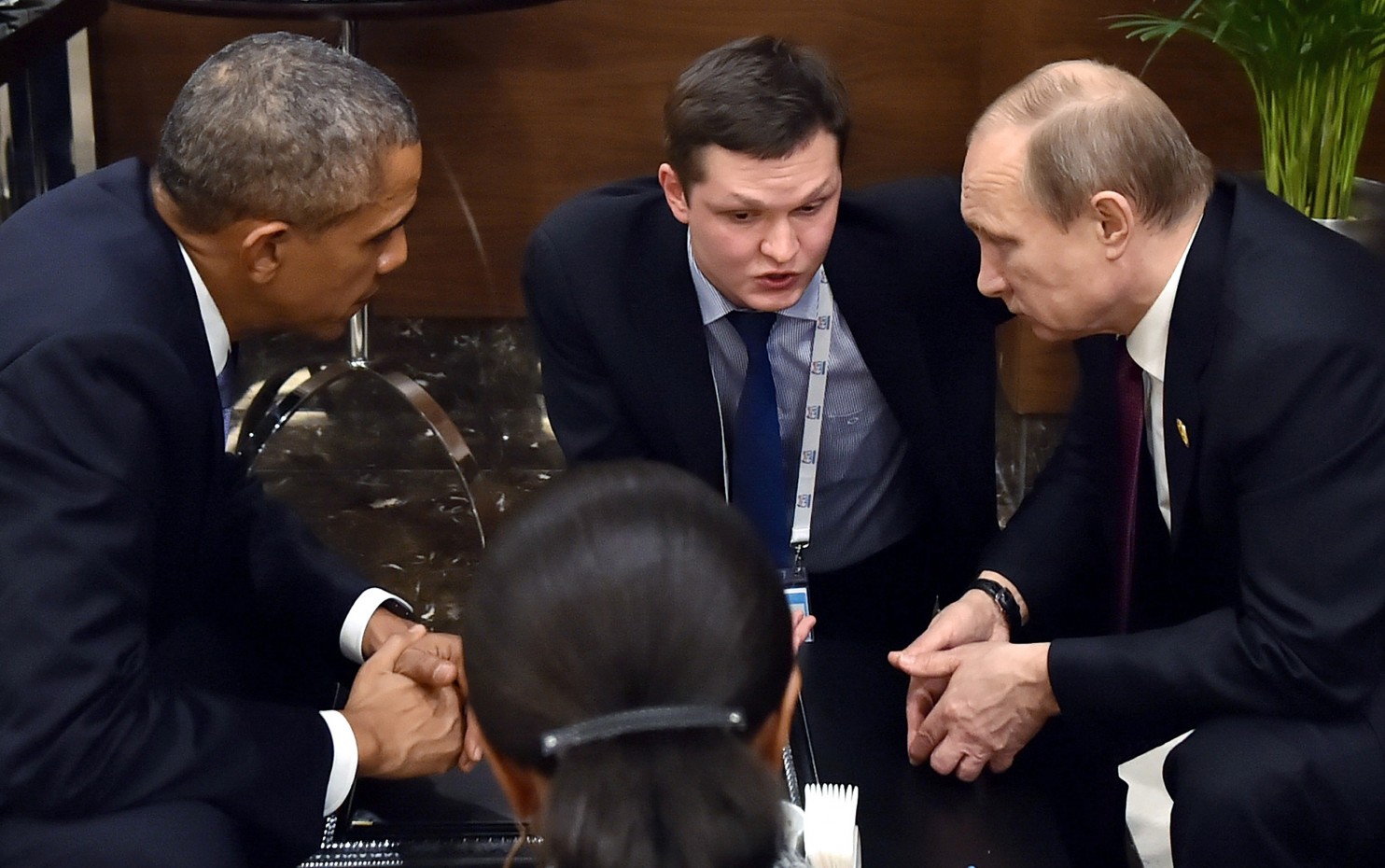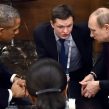
Russia’s Intervention in Syria: Potential Implications for Ukraine
Publication: Eurasia Daily Monitor Volume: 12 Issue: 221
By:

Russia is angling for recognition as the West’s ally in combating “international terrorism.” This, ostensibly, is the rationale of Russia’s military intervention in Syria—an operation made possible by the forfeiture of the Pax Americana in the Middle East, with ripple effects now engulfing Europe. The Kremlin exploits this opportunity to pose as an indispensable ally of the West in a “common cause” against terrorism and associated threats—as Russian President Vladimir Putin suggested in his latest major speech. Some Western policymakers believe Putin’s claim that the West needs Russia’s help in this predicament (Interfax, December 4).
This development entails potential complications for Ukraine, itself the target of Russia’s aggression. Syria (or the wider Levant) is not Russia’s primary objective. Ukraine (and Europe’s East more widely) is that objective. The Kremlin hopes for Western deference to its own priority interests in Ukraine in return for joining with the West in an “anti-terror alliance.”
Moscow sometimes invokes the model of the Second World War’s “anti-Hitler alliance,” with the ensuing Yalta system based on fixed spheres of influence and clear demarcation lines (see EDM, February 26). But this is deceptive. Russia’s strategy is the promotion of disorder, not a new order. It seeks a dynamic system of incremental, case-by-case tradeoffs with the West—over Ukraine and any number of issues—rather than a Grand Alliance and a Yalta Grand Design. Those schemes as such are not repeatable, but some of their elements are. These can include linkages and tradeoffs at third parties’ expense, on an ad hoc basis, within or without a formal “anti-terror coalition” between the West and Russia.
Such a coalition is not within sight at present, and seems unlikely to develop in the Middle East any time soon. The Western powers (particularly, the United States and France) on one hand and Russia on the other have different goals there, along with different sets of designated enemies and clients. For now, Russia’s military intervention in Syria translates far more into nuisance power against the US than into “allied assistance” to the West. Yet, Western policymakers apparently hope that Putin would turn more helpful in choosing his bombing targets in Syria (the Islamic State, instead of the non–Islamic State opposition to Syrian leader Bashar al-Assad) and easing al-Assad out of the presidency for a political solution. In return for such “assistance” (even in anticipation of it) Moscow would probably bring Ukraine into the bargain (see EDM, September 28). As one observer reflecting that view suggests, a US-Russia partnership over the Middle East could facilitate a “compromise over Ukraine,” namely by “federalizing” that country (The New York Times, December 4).
Russia’s official goal in Ukraine, however, stops short of “federalization” at present, focusing instead on a “special status” for the Russian-occupied Donetsk and Luhansk territories (in which case Moscow could promote a chain reaction beyond those territories). But Moscow cannot by itself—not even with Berlin’s help—compel Kyiv to give Donetsk-Luhansk that constitutional status. Only the Barack Obama administration can, if it chooses, cajole Kyiv into doing that. Secretary of State John Kerry recently ruled out any “linkage” between the situation in Syria and that in Ukraine’s east—i.e., no intention to trade off US and Russian interests respectively. Vice President Joseph Biden, in Kyiv with an official visit, has just reaffirmed this “no linkage” policy (Ukrinform, December 8–10; and see accompanying article).
Such reassurances were overdue since Kerry’s visit with Putin in Sochi in May of this year, when they discussed Syria and Ukraine’s east as a package. That resulted in creating the Grigory Karasin–Victoria Nuland channel and Nuland’s two visits to Kyiv, pushing for the legalization of the Donetsk and Luhansk authorities. The argument was that Kyiv must fulfill its political “obligations” under the Minsk armistice (legalizing Russia’s Donetsk-Luhansk proxies) in order to induce Russia to fulfill its military “obligations” (withdrawal of its forces from Ukraine’s territory) under the same document. Russia, however, has invalidated that argument by rejecting any such reciprocity, and the implementation deadline is technically expiring on December 31.
This should strengthen the case for maintaining Western economic sanctions on Russia (weak though they are) in place, undiluted. For their part, Europe’s Russia-Firsters try shifting the onus on Ukraine to “implement Minsk” pre-emptively in the political aspects, so as to excuse Russia’s stonewalling on the military aspects and to undermine the sanctions’ rationale. German Chancellor Angela Merkel straddles the divide, urging both pre-emptive implementation of Minsk by Ukraine and continuation of the sanctions until Russia complies with the Minsk terms. This seemingly balanced position, however, ultimately works against Ukraine, because its so-called “obligations” are clearly spelled out in the Minsk political clauses, while Russia’s are only indirectly phrased in the military and security clauses.
Furthermore, some Europeans now argue that Russian cooperation on Syria or counter-terrorism would justify easing the economic sanctions. Against this, the United States insists that Russia’s actions in Ukraine had triggered the sanctions in the first place, and easing them should depend on Russia’s fulfillment of the Minsk armistice in Ukraine’s east (Crimea-related sanctions are minor and in a separate category).
While the European Union is increasingly divided over the sanctions, the still-prevailing view remains compatible with Washington’s, namely a rollover of the sanctions before this year’s end into next year. Rollover involves prolongation without change and, especially, without debate, so as to avert a split. Only Italy at the moment threatens to block the sanctions’ rollover by the EU, thus in effect threatening a divisive debate (Ukrinform, EurActiv, EUObserver, December 9).
Regardless of its outcome, a divisive debate over sanctions can only encourage Russia to hold out, confident that the EU has reached the utmost limit of its will to enforce sanctions. The EU did not penalize Russia’s January 2015 destruction of the Minsk One armistice with further sanctions; rather Moscow’s actions were essentially ratified in February by Berlin and Paris with a Minsk Two, which is even more favorable to Russia. The subsequent Debaltseve land-grab again had no consequences in terms of sanctions; instead, Berlin, Paris and some key Brussels officials reinterpreted the Minsk Two armistice to require Ukrainian political compliance before Russian military compliance (see above). All this has emboldened Russia to expect the easing of sanctions sooner rather than later, and encouraged the country to try to ride them out as a temporary economic nuisance. But these trends have followed their own dynamics prior to Russia’s offer of “help” on Syria and counter-terrorism; and the intra-EU debate does not seem to be significantly affected as yet by the Kremlin’s offer.




